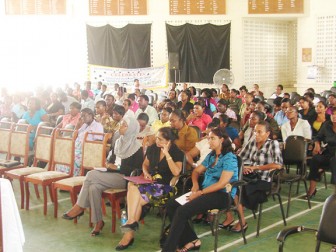–walkout over food aborts corporal punishment discussion
Teachers in Georgetown yesterday aired mixed views about the automatic promotion of poor students but the absence of lunch stood in the way of the consultation going on to deal with the thorny issue of corporal punishment.
At a Ministry of Education-organised consultation held at Queen’s College, that was supposed to hear stakeholders express their views on both corporal punishment and automatic promotions, several teachers recommended that special structured classes be set up to offer remedial work, while others passionately outlined why it should be abolished.
However no views were heard on corporal punishment as the session came to an abrupt end, shortly after 1.30 pm, when President of the Guyana Teachers’ Union (GTU) Colin Bynoe said that given that teachers were at the session since 10 am without a break, water, or provided snacks, it was unfair to continue. His decision was met with the approval of nearly all the teachers present who quickly left, but promised to return whenever ministry decided on a date for the corporal punishment aspect of the forum.

On the issue of non-retention of students, teacher Sharon McAllister said while she wanted to see no child be termed a failure because s/he had to repeat a class, teachers who are giving mandatory remedial classes for students should be adequately compensated. She added that she felt infringed upon when it is “demanded” that remedial classes be held in the afternoons rather than at a time she sets. Her statements on the issue were met with loud applause from her peers. She opined that directives for teaching the remedial classes were vague and while the ministry-coordinated workshops to address the issue and subsequently termed them successful, it was all “a big lie.” “I don’t understand the remediation we are to give to these children. If it must be done in the afternoon; I understand that it is for free… If teachers are going to go the extra mile they will want to be remunerated for that because they can go in the afternoon and make their money. I am very antagonistic when I am going to be bullied,” she said.
“It’s not because of their problems fully that they fail but because as teachers we fail them. During the remediation, teachers [must] have their own material for the remediation of your children and this is wrong it should be provided for…
“There were reports that it was good. I can stand to testify that it was a lie because most of the children that attended it were not the children that needed it… The parents, too, didn’t understand what the remediation was all about. With the no-child left behind, I don’t understand what it is all about,” she added.
Education Minister Priya Manickchand responded that her ministry understands that remedial teaching requires necessary training, while adding that she would investigate how the workshops and directives about their use was given to the teachers countrywide. “If teacher Jane is going to teach … she has to understand… it is a specialised thing, it’s not the regular classroom,” she said.
Deputy Chief Education Officer (Secondary) Melcita Bovell had earlier made a presentation which covered both sides of the divide on the issue. She made it clear that if only one child fails relative testing and is weak at evaluations, educators cannot escape being held responsible as it is the duty of the system to work for every child. If any child is “left behind,” she added, it also a failure of the Ministry of Education since if proper teacher delivery and methodology are used no child will be left behind.
Manickchand informed that the consultations would be used a basis from which government would form policies on the issue. As a result, she emphasised the importance of honest contributions, informing that there was no right or wrong answer.
Teacher Adunni Bascom asked that the ministry reconsider its stance on automatic promotion, as retaining students at the same level if they can’t perform motivated them to strive harder. She said that many of her friends, many years ago, benefited from retention.
“Why should they be promoted after they have not earned it? You keep them back have them study and they will make it to pass the next time around,” one teacher, Miss Stuart, told Stabroek News after the consultations. Asked if she felt it was fair for a child to have to redo all the subjects that s/he would have passed as well as the ones failed, she said she saw no problem with it as she compared her view with those of educators 20 years ago.
“Long ago, it worked and we take it out and the students now don’t feel they have to do anything … They prefer to sit there and say ‘she can’t keep me back anyway,’” she added.
“Antiquated,” was how secondary school teacher Ivor Davis termed Stuart’s opinion. “We live in the now and in this ever changing world we can’t be stuck into what worked for Granny. The curriculum is different. The kids are different. We want a plan that can work for our children not frustrate them… Enough with the black and white let’s make our system work,” he said.





